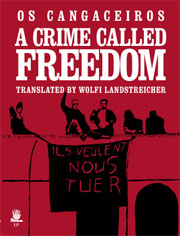Recommended Reading: Os Cangaceiros: A Crime Called Freedom
 Wolfi Landstreicher has delivered yet another interesting translation, this time of documents and analysis surrounding the mysterious French rebel group, Os Cangaceiros. I have been a long time fan of Wolfi's Willful Disobedience and his joint effort, Killing King Abacus. Last years's translation of Fire to the Powder Keg: War and Social Guerrilla Struggle in Iraq was quite enjoyable, even if it was a little dated by the time it came out. Certainly, the insurrectionary influence on my politics owes a fair amount to Wofli's work.
Wolfi Landstreicher has delivered yet another interesting translation, this time of documents and analysis surrounding the mysterious French rebel group, Os Cangaceiros. I have been a long time fan of Wolfi's Willful Disobedience and his joint effort, Killing King Abacus. Last years's translation of Fire to the Powder Keg: War and Social Guerrilla Struggle in Iraq was quite enjoyable, even if it was a little dated by the time it came out. Certainly, the insurrectionary influence on my politics owes a fair amount to Wofli's work.Wikipedia describes Os Cangaceiros this way:
Os Cangaceiros was a group of working class revolutionaries who emerged from the student/worker riots and occupations in France of May 1968. Coming together in Nice, France, Os Cangaceiros – or Les Fossoyeurs du vieux monde (Gravediggers of the Old World) as they were also known – were characteristic of the new antagonistic social movements in post-may Europe that demanded nothing short of an "End of Politics". Described in local Newspapers as “hooligans” and “juvenile delinquents”, they had no formal structure but formed a collective of individual desires capable of finding expression in one another. With Never work . . . Ever. as their program, they set about creating the circumstances that would immediately make this possible. To this end, they collectivized their resources and their talents for crime that sat easily with their desire for adventure.The translation makes for easy reading. I found this essay, entitled "Industry As The Origins Of Modern Domination", particularly interesting. Here's an excerpt from an earlier translation I found on the web:
They would move throughout the south of France making friends and initiating actions autonomously; most often against police, union bureaucracy, politicians and social managers of every sort. They lived nomadically and sought to identify spaces where dissatisfaction was reaching a peak and to pass through there in order to exacerbate situations within the limits of their resources. Particularly, they highlighted the role played by liberal, social democrats and leftists to manipulate and recuperate those in revolt to their own ends, taking the struggle’s determination out of the hands of a generalized radicality that had its own dynamic.
Let's stress once and for all that we, Os Cangacerios, don't come from leftism: there isn't a single ex-leftist among us. And none of us has ever been mixed up with any kind of political racket in any way. We have only one form of relation with political groups and organizations: war. They're all our enemies, there's no exception. This included anarchism and their struggles with anarchists in Paris led to at least one fatal casualty.
Of all the slander heaped on the Luddites, the worst came from labor movement apologists, who regarded it as blind and infantile. Hence the following passage from Marx's Capital. Representing a fundamental misinterpretation of the era: "Time and experience were needed before the workers learned to distinguish between machines themselves and the manner in which they were used by capital, and to direct their attacks against the specific social context in which they were used, and not against the physical instruments of production themselves."This group, until recently unknown to me, had a lot of inspiring things to say from a non-leftist anti-authoritarian, anti-capitalist and anti-industrial perspective and I look forward very much to Wolfi's next volume of OC translations to appear.
This materialistic conception of the neutrality of machines sufficed to legitimatize the organisation of work, iron discipline (on this point Lenin was a consistent Marxist}, and ultimately everything else that followed. Allegedly backwards, the Luddites at least understood that the "material instruments of production" are above all instruments of domestication whose form is not neutral because it guarantees hierarchy and dependence.
Those who delve into the article I recommended above might find it worthwhile to follow it up with any of the essays from section 2 of John Zerzan's Elements of Refusal, or perhaps Kirkpatrick Sale's essay "The Imposition of Technology". I plan on following this book up with Georgy Katsiaficas', The Subversion of Politics, which is finally out in a complete English translation.
Labels: essays, recommended reading


0 Comments:
Post a Comment
<< Home